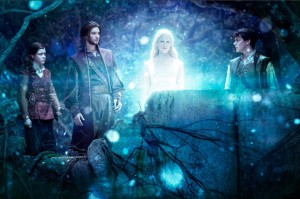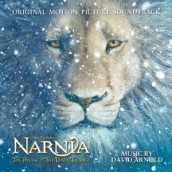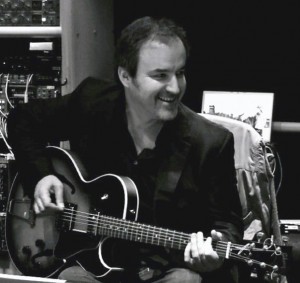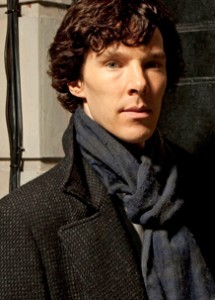If there’s one composer who knows how to take Earthlings to a land of mystical enchantment, and then get most of them back in one piece, it would be David Arnold. With only the Brit crime drama YOUNG AMERICANS behind him, Arnold’s Hollywood debut on 1994’s STARGATE hit the scoring world with the resonance of a nuclear bomb, if said explosion could be heard as a blinding flash of lush orchestral themes, epic choruses and swashbuckling adventure.
Arnold’s professional quest since then has heard him take on diverse styles from the epic action of INDEPENDENCE DAY and LAST OF THE DOGMEN to musical revamps of classic monster-bashing (GODZILLA), blaxploitation funk (SHAFT) and black comedy (THE STEPFORD WIVES).
Arnold has also helped reboot the musical voices of two fellow English heroes with Sherlock Holmes and Agent 007, with his propulsive entries for the series like TOMORROW NEVER DIES, CASINO ROYALE and QUANTUM OF SOLACE has recalled the spirit of John Barry while surpassing his record for scoring Bond thrillers.
Yet funny enough, David Arnold hasn’t tread on an alien world since the breakthrough of STARGATE, which makes his passage aboard THE VOYAGE OF THE DAWN TREADER so exceptionally pleasing- not to mention far more kid-friendly than the franchise’s last entry PRINCE CASPIAN.
Taking up the NARNIA scoring sword from Harry Gregson-Williams, Arnold makes a symphonic splash that marks his third collaboration with director Michael Apted after THE WORLD IS NOT ENOUGH and AMAZING GRACE. And as Aslan the lions leads the returning English youths, Prince Caspian and a host of beloved magical creatures through sometimes stormy waters, Arnold unleashes the kind of old-school fantastical melodies, brooding choruses, nautical swashbuckling and sorely missed sweet magic that’s sure to please the ears of legions of C.S. Lewis fans. It’s a score that’s also full of that old time thematic religion for lovers of big movie score melody, let alone audiences who appreciate tunes that sweep their still-young imaginations into new worlds.
Now riding high this holiday season with NARNIA and the girl power of MORNING GLORY and MADE IN DAGENHAM, David Arnold talks about a musical voyage that returns him to the kind of world where it all began.
ASSIGNMENT X: How far back does your familiarity with the NARNIA books go? Did you read them as a child?
DAVID ARNOLD: I read the first three as a child and that was it for me. I think I moved on to Greek myths and legends afterwards. But for the movie I read the entire series. The books conjured up the same images when I read them as an adult as it did when I read them as a child
AX: While you were very well versed in stepping into 007‘s musical saga, what was it like coming in on the third NARNIA of the series?
ARNOLD: The advantage of this movie was that the story was so different to the previous two and the places they visit are so different. Susan and Peter are no longer in the story, and the witch is really only hinted at once or twice. So it felt almost like a new movie with some familiar characters rather than the third in a traditional trilogy. It helped that the director Michael Apted and I have done three films together previous to this, so he made it clear that he wanted the movie to be different in many ways, while we both felt strongly about retaining the heart of the first two NARNIA movies.
AX: Your last film with Michael was THE WORLD IS NOT ENOUGH, which might be my favorite of your Bond scores. Did your collaboration differ here, since this is a far different “action” film for the younger set?
ARNOLD: I wrote thematic ideas for the movie away from it. I knew the book and never read the script, so the ideas were inspired by the text. I played Michael quite a few ideas before I had seen a frame of the film. If he could feel his movie in my music, then I thought the task of making it stick to the film would not be not quite so hard. In that way, our collaboration wasn’t that different. DAWN TREADER had been a long haul for Michael. It took him several years with all the delays and the studio issues to make it, so I was two years late coming to score it. I tried to be as supportive of him as I could and he did the same for me. He’s a gentleman, and we probably had more real fun and genuine enjoyment scoring this film than we had on any of our previous collaborations.
AX: Did you want to reference the tone that Harry had done for the previous NARNIA‘s, or do something completely different, especially since PRINCE CASPIAN was viewed as many as being too dark? In that respect, did you want to do a “lighter,” more magical score?
ARNOLD: The key for me was bringing the magic back. I said early on that I wanted the music to be optimistic whenever it could, to not be cynical or foreboding unless it absolutely had to. I was aware that CASPIAN had taken a darker route in the second film, and that perhaps now we could sprinkle some more fairy dust on the moments and really allow ourselves to enjoy that aspect of it.
AX: The last score where you truly created an alien world was with STARGATE. Did that make it particularly appealing to return to a fantasy realm with DAWN TREADER?

Georgie Henley, Ben Barnes, Skandar Keynes in THE CHRONICLES OF NARNIA - THE VOYAGE OF THE DAWN TREADER | ©20th Century Fox/Walden Media
ARNOLD: I loved doing those big old movies with Roland Emmerich. They were so over the top, and without rules or restrictions. NARNIA was a chance to play with those ideas again. It had been a while since I had scored a movie where most of the problem solving was acoustic and orchestrally driven
AX: With much of this NARNIA set on a ship, how did you want your music to convey a nautical sense of adventure?
ARNOLD: I think in these movies, big themes and big tunes sell the story. I tried to write a DAWN TREADER theme that made you feel like it was not only noble and heroic as a ship, but a place that served as a home to everyone on it for the duration of this movie
AX: Could you tell us about your approach to the various character themes?
ARNOLD: In addition to the main DAWN TREADER theme, there is a “green mist” theme that obviously needs to convey the dread and inherent evil of it. It temps the young characters with music that is childlike, but is also seductive and a little off kilter. There is a theme for the mission to find the swords, and ultimately one for the lost Lords of Narnia, who owned the weapons. This theme and the others were sort of hymnal in a way. I was also very aware of the spiritual importance many fans have with these stories, so I felt like there should be a sense of reverence in the themes, whilst still being hopefully memorable, fun and evocative
AX: There are some interesting effects you achieve with high winds and percussion here. Could you tell us about the more exotic “ethnic” elements of DAWN TREADER‘s score?
ARNOLD: Bryon Wallace was on the Ram’s Horn. Mauricio Venegas played the Penny Whistle and Jan Hendrickse had the Duduk. The passion and skill of these three guys really made their instruments’ sounds come to life. I also recorded a small choir of 10-year-old girls who I got to whisper and scream and hum. Then I went away with the recordings with Rob Playford to create soundscapes using these voices so we could make disturbing sounds that were rooted in human voice, but more disturbingly in children’s voices. This helped the sense of naiveté with the kids, the dread of the witch as she tempts the children. So the chorus becomes more warped and disturbing, as the corruption of innocent voices mirrors the film’s evil forces.
AX: Like STARGATE, DAWN TREADER makes powerful use of the choral voices. Why do you think that approach fits genre epics so well, and do the words actually mean anything here- a la the Elvish language that Howard Shore used for the RINGS films?
ARNOLD: Choir has always meant “epic” when presented like this. I suppose that comes from the human quality of direct performance. No instruments, just people singing. I think that’s what touches us so hearing a chorus. Plus, everyone sings at some point in their life, or has been sung to – usually by their parents, which makes a chorus so “familiar” to us. The words I used for DAWN TREADER were derived from Latin, as I didn’t want to use the English language to give a direct meaning to the words, or else they’d become a Greek chorus that comment on the drama. Here it’s Latin phrases that directly relate to what we are seeing on the screen
AX: Do you hope that this might be the start of a “reset” on the NARNIA films, both in terms of tone, and in you doing several more films in the series?
ARNOLD: I was happy to have joined the NARNIA family, and I guess that any future movie would be decided largely by the appetite the public has for this one. They’re all great stories, and there is always a need for that in modern cinema
AX: You’ve also scored two “chick flicks” which are playing in theaters now with MORNING GLORY and MADE IN DAGENHAM. GLORY reunites you with CHANGING LANES director Roger Michel, who brought out one of your most unique scores for CHANGING LANES. Did you hope to give a different spin on the musically typical American “rom-com” genre with MORNING GLORY?
ARNOLD: Both Roger and I wanted to avoid the pizzicato strings and piano approach to American rom-com’s. So we went for half of the MORNING GLORY score being an optimistic, simple tune on piano which was a theme for the lead character Becky’s hopes and dreams. But the big difference was trying to make the music for Becky and the newsroom very spiky. I ended up with a jazz based core of piano, vibes and stand up bass with a battery of weird percussion, body hits and other stuff we could find in the studio to hit.
AX: While there’s not much romance in MADE IN DAGENHAM, it also features a strong, go-getting woman at its center. Could you tell us about how you approached a score that was about females exerting their political will in a less “fluffier” context?
ARNOLD: As there were a lot of songs in the movie, I wanted the music to represent both the energy, momentum and determination of the women, but also to offer us a view of the Ford plant itself as a character, which was the polar opposite of them. It’s music is relentless, ugly, automated and unstoppable, because this was a “David and Goliath” story of the women fighting for their rights. DAGENHAM had a good filmmaking team to work with, and I loved the movie. I also think it actually is romantic to have these characters find their way and achieve what they do – just not in the traditional sense of being “romantic.”
AX: You’ve also scored another legendary English hero with the new SHERLOCK TV series, which is getting a real following over here. How did you want to “update” the past musical takes on Holmes for the series’ modern setting?
ARNOLD: I wrote the SHERLOCK music with my friend Michael Price, as I was tied up on MORNING GLORY, and couldn’t get it all done myself. The problem was that we had written the pilot together a year previously, and what the BBC wanted to do was make it into three 90 minute films rather than the original six 60-minute episodes of the series we thought we’d be doing. So the writers had to go back and re-write everything, and we ended up almost a year late coming to the show than expected- by which time, of course, Guy Ritchie had also brought his SHERLOCK HOLMES movie out. I was pleased that our show was so dramatically different than his movie version. When I first saw our SHERLOCK, I thought it was the most exciting TV show had seen in five years. Its star Benedict Cumberbatch was also a friend from the time I scored AMAZING GRACE for Michael Apted, so it was especially gratifying to see him turn in such a spectacular performance which was entirely grounded by Martin Freeman who allows us access to the show and also allows Benedicts’ Holmes to be as wild as he is. I didn’t watch previous Sherlock Holmes shows or films, so I wasn’t aware of any updating of anything musically for the character. I don’t recall a Sherlock theme that everyone would associate with the character, so this series was a clean slate for me.
AX: This year you put on a spectacular film score benefit for CARE that seemed to feature just about every top composer on both sides of the Atlantic. Could you talk to us about what inspired you to put on the show, and the challenges involved?
ARNOLD: If you visit Care International’s websites then you will see what inspires me to do as much as I can for them. I visited Rwanda with them to see what was going on out there and what they were doing to help. Similarly, I hope to travel to India, Haiti and other places next year to keep up with everything, and bring to peoples’ attention as to what can be done. The challenges of putting on the concert were mainly financial. But luckily, all the composers took care of themselves. They sorted their own music and travel, and were extraordinarily generous with their time and commitment. Tommy Pearson who produced the show with me and Conal Dodds at Metropolis co-ordinated much of the concert. It was a lovely evening, and incredibly good humored and uplifting
AX: Do you think that people on your side of the pond have far more success at staging film music concerts that feature more challenging material than we get over here? And do you think it shows a greater respect for film music as an art form than Americans give it?
ARNOLD: The CARE concert featured that music because I was a composer and a fan of film music. There is probably a glass ceiling of interest with film music that isn’t the greatest hits stuff- i.e. STAR WARS, James Bond, etc. So I’m not surprised that there aren’t more concerts like it. I’m hoping to put on a similar show in LA next year for Care, with some of the people who couldn’t make the London show. We will see just how popular the art form is in America soon!
AX: Now that it looks like the next Bond is finally getting going, have you thought about what you’d like to do for the next score? And how do you hope Bond’s character, and the series continues to evolve?
ARNOLD: I haven’t thought about it yet. We only just got the news that we’re back on. But ‘there’s many a slip twixt cup and lip,’ so I will keep quiet until I get a script and then start writing ideas. I just hope the next one is as good as my favorites, as I think everyone does. And I’m always interested in what Daniel Craig brings to the part. But like most things with movies, if it ain’t on the page … all I can say is that I’m looking forward to a great script for it, alongside every other Bond fan in the world!
Take a voyage with David Arnold and the DAWN TREADER HERE
Related Posts:













